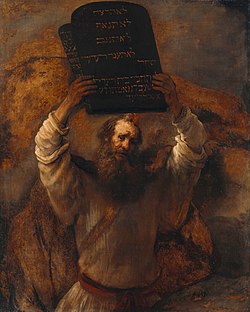Moses Quotes
About Author
In Abrahamic religions, Moses was the Hebrew prophet who led the Israelites out of slavery in the Exodus from Egypt. He is considered the most important prophet in Judaism and Samaritanism, and one of the most important prophets in Christianity, Islam, the Baháʼí Faith, and other Abrahamic religions. According to both the Bible and the Quran, God dictated the Mosaic Law to Moses, which he wrote down in the five books of the Torah.
According to the Book of Exodus, Moses was born in a period when his people, the Israelites, who were an enslaved minority, were increasing in population; consequently, the Egyptian Pharaoh was worried that they might ally themselves with Egypt's enemies. When Pharaoh ordered all newborn Hebrew boys to be killed in order to reduce the population of the Israelites, Moses' Hebrew mother, Jochebed, secretly hid him in the bulrushes along the Nile river. Pharaoh's daughter discovered the infant there and adopted him as a foundling, thus he grew up with the Egyptian royal family. After killing an Egyptian slave-master who was beating a Hebrew, Moses fled across the Red Sea to Midian, where he encountered the Angel of the Lord, speaking to him from within a burning bush on Mount Horeb.
God sent Moses back to Egypt to demand the release of the Israelites from slavery. Moses said that he could not speak eloquently, so God allowed Aaron, his elder brother, to become his spokesperson. After the Ten Plagues, Moses led the Exodus of the Israelites out of Egypt and across the Red Sea, after which they based themselves at Mount Sinai, where Moses received the Ten Commandments. After 40 years of wandering in the desert, Moses died on Mount Nebo at the age of 120, within sight of the Promised Land.
The majority of scholars see the biblical Moses as a legendary figure, while retaining the possibility that Moses or a Moses-like figure existed in the 13th century BCE. Rabbinic Judaism calculated a lifespan of Moses corresponding to 1391–1271 BCE; Jerome suggested 1592 BCE, and James Ussher suggested 1571 BCE as his birth year. In the writing of Jewish historian Josephus, the Egyptian historian Manetho is quoted writing of a treasonous ancient Egyptian priest, Osarseph, who renamed himself Moses and led a successful coup against the presiding pharaoh, subsequently ruling Egypt for years until the pharaoh regained power and expelled Osarseph and his supporters.
Moses has often been portrayed in Christian art and literature, for instance in Michelangelo's Moses and in works at a number of U.S. government buildings. In the medieval and Renaissance period, he is frequently shown as having small horns, as the result of a mistranslation in the Latin Vulgate Bible. Moses has faced criticism for ordering the massacre of Midianites in Numbers 31—denounced by Thomas Paine as a villain, framed by some rabbis as a moral allegory, and challenged by modern scholars for its ethical and feminist implications.
According to the Book of Exodus, Moses was born in a period when his people, the Israelites, who were an enslaved minority, were increasing in population; consequently, the Egyptian Pharaoh was worried that they might ally themselves with Egypt's enemies. When Pharaoh ordered all newborn Hebrew boys to be killed in order to reduce the population of the Israelites, Moses' Hebrew mother, Jochebed, secretly hid him in the bulrushes along the Nile river. Pharaoh's daughter discovered the infant there and adopted him as a foundling, thus he grew up with the Egyptian royal family. After killing an Egyptian slave-master who was beating a Hebrew, Moses fled across the Red Sea to Midian, where he encountered the Angel of the Lord, speaking to him from within a burning bush on Mount Horeb.
God sent Moses back to Egypt to demand the release of the Israelites from slavery. Moses said that he could not speak eloquently, so God allowed Aaron, his elder brother, to become his spokesperson. After the Ten Plagues, Moses led the Exodus of the Israelites out of Egypt and across the Red Sea, after which they based themselves at Mount Sinai, where Moses received the Ten Commandments. After 40 years of wandering in the desert, Moses died on Mount Nebo at the age of 120, within sight of the Promised Land.
The majority of scholars see the biblical Moses as a legendary figure, while retaining the possibility that Moses or a Moses-like figure existed in the 13th century BCE. Rabbinic Judaism calculated a lifespan of Moses corresponding to 1391–1271 BCE; Jerome suggested 1592 BCE, and James Ussher suggested 1571 BCE as his birth year. In the writing of Jewish historian Josephus, the Egyptian historian Manetho is quoted writing of a treasonous ancient Egyptian priest, Osarseph, who renamed himself Moses and led a successful coup against the presiding pharaoh, subsequently ruling Egypt for years until the pharaoh regained power and expelled Osarseph and his supporters.
Moses has often been portrayed in Christian art and literature, for instance in Michelangelo's Moses and in works at a number of U.S. government buildings. In the medieval and Renaissance period, he is frequently shown as having small horns, as the result of a mistranslation in the Latin Vulgate Bible. Moses has faced criticism for ordering the massacre of Midianites in Numbers 31—denounced by Thomas Paine as a villain, framed by some rabbis as a moral allegory, and challenged by modern scholars for its ethical and feminist implications.
